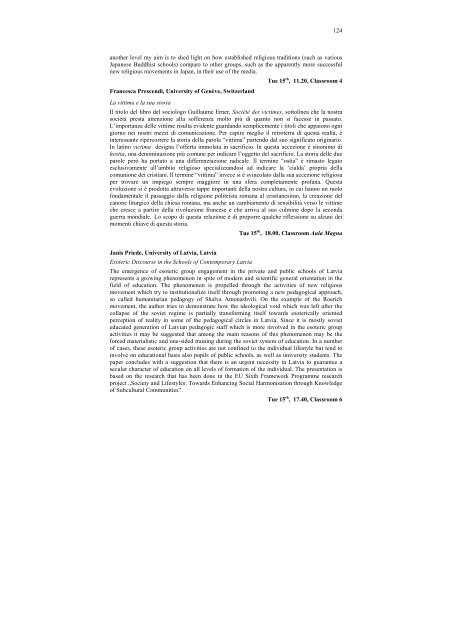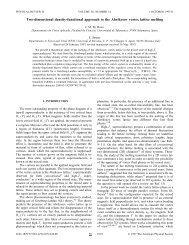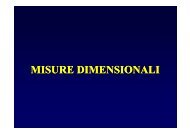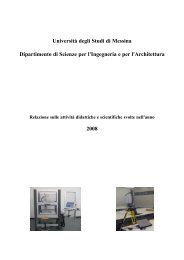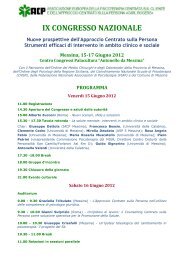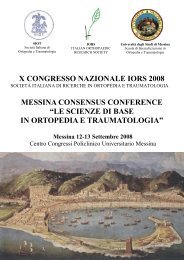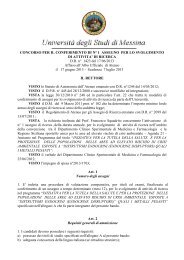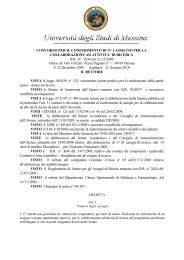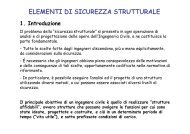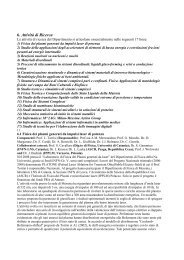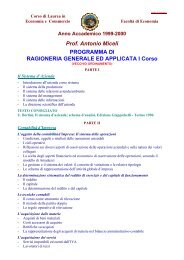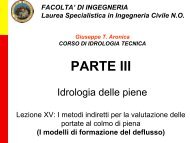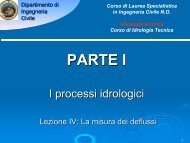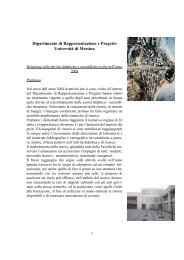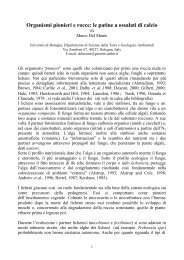PROGRAMME AND ABSTRACTS - Università degli Studi di Messina
PROGRAMME AND ABSTRACTS - Università degli Studi di Messina
PROGRAMME AND ABSTRACTS - Università degli Studi di Messina
You also want an ePaper? Increase the reach of your titles
YUMPU automatically turns print PDFs into web optimized ePapers that Google loves.
124<br />
another level my aim is to shed light on how established religious tra<strong>di</strong>tions (such as various<br />
Japanese Buddhist schools) compare to other groups, such as the apparently more successful<br />
new religious movements in Japan, in their use of the me<strong>di</strong>a.<br />
Francesca Prescen<strong>di</strong>, University of Genève, Switzerland<br />
La vittima e la sua storia<br />
Tue 15 th , 11.20, Classroom 4<br />
Il titolo del libro del sociologo Guillaume Erner, Société des victimes, sottolinea che la nostra<br />
sociétà presta attenzione alla sofferenza molto più <strong>di</strong> quanto non si facesse in passato.<br />
L’importanza delle vittime risulta evidente guardando semplicemente i titoli che appaiono ogni<br />
giorno nei nostri mezzi <strong>di</strong> comunicazione. Per capire meglio il retroterra <strong>di</strong> questa realtà, è<br />
interessante ripercorrere la storia della parola “vittima” partendo dal suo significato originario.<br />
In latino victima designa l’offerta immolata in sacrificio. In questa accezione è sinonimo <strong>di</strong><br />
hostia, una denominazione più comune per in<strong>di</strong>care l’oggetto del sacrificio. La storia delle due<br />
parole però ha portato a una <strong>di</strong>fferenziazione ra<strong>di</strong>cale. Il termine “ostia” è rimasto legato<br />
esclusivamente all’ambito religioso specializzandosi ad in<strong>di</strong>care la ‘cialda’ propria della<br />
comunione dei cristiani. Il termine “vittima” invece si è svincolato dalla sua accezione religiosa<br />
per trovare un impiego sempre maggiore in una sfera completamente profana. Questa<br />
evoluzione si è prodotta attraverso tappe importanti della nostra cultura, in cui hanno un ruolo<br />
fondamentale il passaggio dalla religione politeista romana al cristianesimo, la creazione del<br />
canone liturgico della chiesa romana, ma anche un cambiamento <strong>di</strong> sensibilità verso le vittime<br />
che cresce a partire della rivoluzione francese e che arriva al suo culmine dopo la seconda<br />
guerra mon<strong>di</strong>ale. Lo scopo <strong>di</strong> questa relazione è <strong>di</strong> proporre qualche riflessione su alcuni dei<br />
momenti chiave <strong>di</strong> questa storia.<br />
Janis Priede, University of Latvia, Latvia<br />
Esoteric Discourse in the Schools of Contemporary Latvia<br />
Tue 15 th , 18.00, Classroom Aula Magna<br />
The emergence of esoteric group engagement in the private and public schools of Latvia<br />
represents a growing phenomenon in spite of modern and scientific general orientation in the<br />
field of education. The phenomenon is propelled through the activities of new religious<br />
movement which try to institutionalize itself through promoting a new pedagogical approach,<br />
so called humanitarian pedagogy of Shalva Amonashvili. On the example of the Roerich<br />
movement, the author tries to demonstrate how the ideological void which was left after the<br />
collapse of the soviet regime is partially transforming itself towards esoterically oriented<br />
perception of reality in some of the pedagogical circles in Latvia. Since it is mostly soviet<br />
educated generation of Latvian pedagogic staff which is more involved in the esoteric group<br />
activities it may be suggested that among the main reasons of this phenomenon may be the<br />
forced materialistic and one-sided training during the soviet system of education. In a number<br />
of cases, these esoteric group activities are not confined to the in<strong>di</strong>vidual lifestyle but tend to<br />
involve on educational basis also pupils of public schools, as well as university students. The<br />
paper concludes with a suggestion that there is an urgent necessity in Latvia to guarantee a<br />
secular character of education on all levels of formation of the in<strong>di</strong>vidual. The presentation is<br />
based on the research that has been done in the EU Sixth Framework Programme research<br />
project „Society and Lifestyles: Towards Enhancing Social Harmonisation through Knowledge<br />
of Subcultural Communities”.<br />
Tue 15 th , 17.40, Classroom 6


